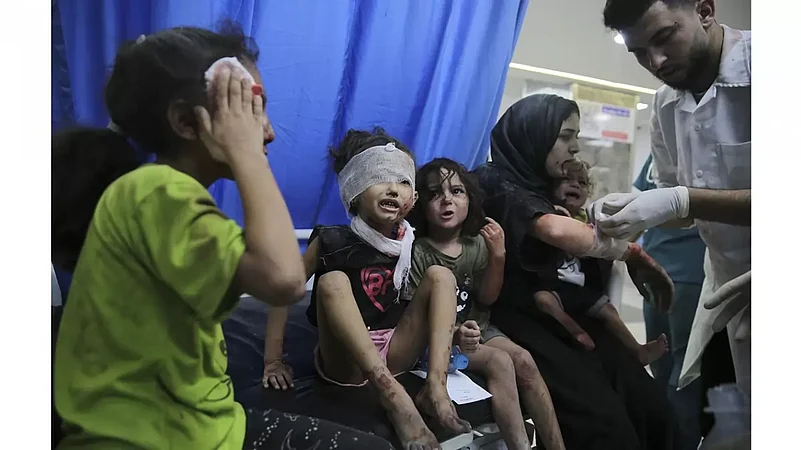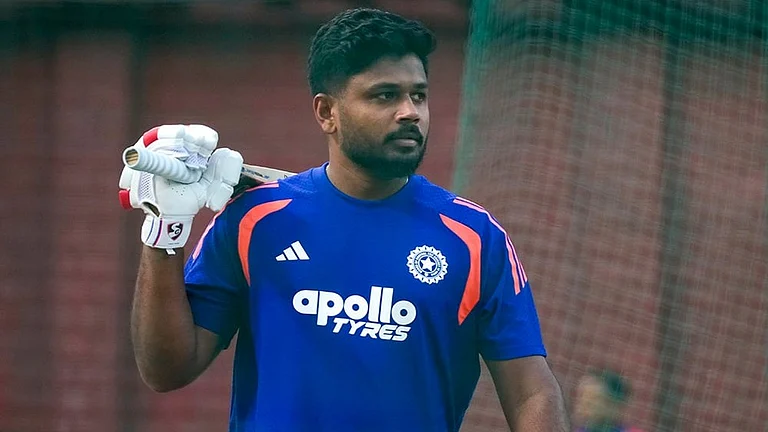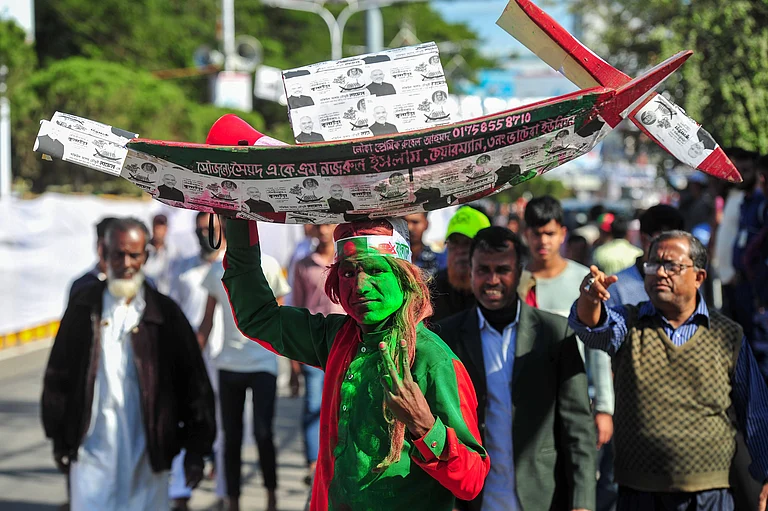Amid continued attacks in northern Israel from Hezbollah in Lebanon, the Israeli government on Monday announced it is evacuating 28 communities in the border area. It comes a day after Israel evacuated the vast majority of residents from the town of Sderot in southern Gaza that's under constant rocket-fire from Hamas.
The World Health Organization (WHO) warned that a "catastrophe" is imminent in Gaza if relief supplies don't arrive within the next 24 hours as water and fuel stocks are not expected to last another day.
The WHO's warning comes as international negotiations for the supply of aid to Gaza continue. Trucks full of aid are lined up at the Rafah crossing at the Egypt-Gaza border but have not yet crossed over into Gaza as a final agreement over the modalities over the supply of aid is yet to be reached. Israel has also opened water supply to southern Gaza, where hundreds of thousands of Palestinians have fled to from the northern parts of the region.
In a related development, US President Joe Biden, who continues to staunchly support Israel in the war with Hamas, warned against the occupation of Gaza in case Israel launches a ground offensive into the territory. The Gaza, along with the West Bank, is part of the Palestinian territories in the region. It is under Hamas's control since 2007. Ever since the all-out Hamas attack on Israel on October 7 that killed at least 1,400 and injured over 3,900, a ground offensive has been widely expected.
In response to the Hamas attack, Israel has also launched airstrikes in Gaza to take down Hamas facilities and leaders. The airstrikes have, however, caused widespread civilian casualties as well. Aat least 2,800 Palestinians have been killed and over 10,000 have been injured, including civilians and hundreds of children, according to Al Jazeera.
Israel evacuates northern areas amid attacks from Lebanon
Amid continuous attacks by Hezbollah from Lebanon, the Israeli government on Monday ordered evacuation of 28 community in the area along the Lebanon border in the country's north.
The evacuations in the north comes after Israel evacuated most of residents from the town of Sderot in southern Gaza that's under constant rocket-fire from Hamas.
The Israeli military on Monday said in a statement that residents within 2 kms of the Lebanon border are being evacuated to state-run facilities.
The attacks from the Lebanon have continued as "several posts" of the military and a tank were targeted on Monday in north Israel, according to The Times of Israel.
Meanwhile, rocket attacks have also continued in north and central Israel, with a "major barrage" triggering sirens in Jerusalem, Tel Aviv, Ashkelon and elsewhere, according to The Times of Israel.
WHO warns of 'catastrophe' as supplies enter final 24 hours
The World Health Organization (WHO) on Monday said that supplies need to enter Gaza Strip within the next 24 hours in order to prevent a "catastrophe".
The WHO said that the reserves of food, medicine, and fuels are not going to last another day, according to AFP.
WHO regional chief Ahmed al-Mandhari told AFP that if aid does not arrive in Gaza within the next 24 hours, doctors will have to "prepare death certificates for their patients". He added that Gaza is heading towards "a real catastrophe".
The AFP reported that power outages in the absence of supply from Israel threaten to cripple life-support systems, water desalination plants, food refrigeration, and hospital incubators.
While the humanitarian situation in Gaza was already dire since 2007 when Israel and Egypt imposed a blocked after Hamas, a designated terrorist organisation, took control after driving away rival Palestinian political faction Fatah, the situation worsened after Israel imposed "complete siege" after the October 7 Hamas attack and cut off power and water supply. Gaza depends on Israel for a third of its water supply requirements.
In the southern regions, where Israel told Palestinian civilians to go from northern regions to avoid coming in between the fight with Hamas, Israel has opened water supplies. The delivery of broader aid supplies, however, remains stalled.
As many as half a million Palestinians are displaced within Gaza, most of whom have rushed to the southern regions.
Talks continue over delivery of aid in Gaza
Even as a top United Nations (UN) official said "good news" on the humanitarian supplies to Gaza Strip is expected soon, no agreement has yet been reached and diplomats continue to hold negotiations to strike a deal.
Trucks are lined up at the Rafah crossing at the Egypt-Gaza border but are yet to cross over in the absence of any agreement. Earlier, reports emerged that a ceasefire has been struck in southern Gaza but the reports were denied by both Israel and Hamas.
The New York Times reported UN humanitarian aid coordinator Martin Griffiths as saying that talks among Israel, Egypt, the United States and others could soon yield "good news" on delivering aid to southern Gaza.
The NYT also reported US Secretary of State Antony Blinken as saying that that the Rafah crossing would open. A timeline was, however, not provided.
"Secretary of State Antony J. Blinken said on Sunday that the Rafah border crossing with Egypt would reopen, raising hope that food and medicine could be brought into Gaza and foreigners could get out. The U.S. Embassy in Jerusalem told American citizens in Gaza on Monday to “move closer” to the Rafah crossing if they believed it was “safe” to do so. But hours later, the scores of people who had gathered on the Gaza side of the crossing, toting what they could carry in suitcases, were stuck waiting as diplomatic efforts for a solution floundered," reported NYT.
In a separate development, Israel has opened water supply to southern Gaza. Around a third of Palestinians are dependent on water supplies from Israel.
In another development, US President Joe Biden supported the decimation of Hamas but warned against the occupation of Gaza by Israel after the expected land offensive into the region. He told CBS in an interview that an Israeli occupation of Gaza would be a "big mistake" but approved the destruction of Hamas. He also said that there needs to be a way for the creation of a Palestinian state. Earlier, Biden has supported the two-state solution to the Israel-Palestine issue.
Israel kills Hamas intelligence chief in strike
The Israeli military on Monday said that a regional intelligence chief of Hamas was killed in the Khan Yunis area of Gaza Strip in an airstrike.
The military did not release further details about the Hamas leader or anything else.
So far, Israeli attacks have killed at least six top Hamas figures, including Hamas ministers and two commanders associated with the attack on Israel. It has also captured a top commander of Hamas naval force. In a post on Twitter, the military released the names of designations of six top leaders killed.
At least 199 hostages in Gaza: Israel
The Israeli government has said that there at least 199 hostages in Gaza Strip.
The number is more than the initial estimates that initially said that around 100 were held in Gaza. The figure was later amended to around 150.
The issue of hostages is central to the ongoing situation as any ground offensive comes with the risk of compromising the situation of hostages, whose execution Hamas has threatened.
Hamas has already paraded injured and dead hostages in Gaza, including a German woman whose video was widely circulated and condemned. In the video, she was being paraded in a truck in a semi-naked state amid celebratory cheering in Gaza.


























